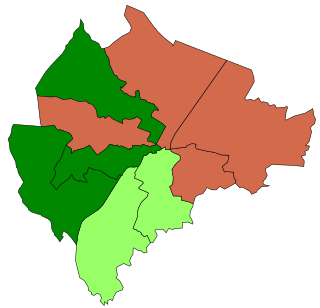 W
WThe 2000 Ulster Unionist Party leadership election was triggered by the decision of Martin Smyth to challenge incumbent David Trimble over the party's direction in the implementation of the Belfast Agreement at the party's annual general meeting on 25 March 2000. The UUP has held a leadership election every March since at least the Ulster Unionist Council constitution was altered in 1973, however it is rarely contested. This is one of the few occasions when it has been contested.
 W
WThese are the results of the 2001 United Kingdom general election in Northern Ireland. The election was held on 7 June 2001 and all 18 seats in Northern Ireland were contested. 1,191,009 people were eligible to vote, up 13,040 from the 1997 general election. 68.63% of eligible voters turned out, up 1.2 percentage points from the last general election.
 W
WThe 2003 election to the Northern Ireland Assembly was held on Wednesday, 26 November 2003, after being suspended for just over a year. It was the second election to take place since the devolved assembly was established in 1998. Six members from each of Northern Ireland's eighteen Westminster Parliamentary constituencies were elected by single transferable vote, giving a total of 108 Members of the Legislative Assembly (MLAs). The election was contested by 18 parties and a number of independent candidates.
 W
WElections to Belfast City Council were held on 5 May 2005 on the same day as the other Northern Irish local government elections. The election used nine district electoral areas to elect a total of 51 councillors, most representing the more heavily populated north and west.
 W
WElections for local government were held in Northern Ireland on 5 May 2005, contesting 582 seats in all, along with the 2005 general election across the entire United Kingdom and local elections in England.
 W
WThe 2005 Ulster Unionist Party leadership election began on 7 May 2005 when David Trimble resigned as leader of the Ulster Unionist Party following his party's poor performance in the 2005 general election when it lost all but one of its seats, including Trimble's own. Following his resignation, the UUP's Executive Committee charged Sir Reg Empey, Lady Hermon and Lord Rogan with the interim leadership of the Party.
 W
WThe 2005 United Kingdom general election in Northern Ireland was held on 5 May 2005 and all 18 seats in Northern Ireland were contested. 1,139,993 people were eligible to vote, down 51,016 from the 2001 general election. 63.49% of eligible voters turned out, down 5.1 percentage points from the last general election.
 W
WThe 2007 election to the Northern Ireland Assembly was held on Wednesday, 7 March 2007. It was the third election to take place since the devolved assembly was established in 1998. The election saw endorsement of the St Andrews Agreement and the two largest parties, the Democratic Unionist Party (DUP) and Sinn Féin, along with the Alliance Party, increase their support, with falls in support for the Ulster Unionist Party (UUP) and the Social Democratic and Labour Party (SDLP).
 W
WElections for local government were held in Northern Ireland on 7 June 2001, contesting 582 seats in all, along with the 2001 general election across the entire United Kingdom.
 W
WThe 2004 Ulster Unionist Party leadership election was triggered by the decision of a group of UUP members to challenge incumbent leader David Trimble over the party's direction following the 2003 Northern Ireland Assembly elections at the party's annual general meeting on 27 March 2004. The UUP has held a leadership election every March since at least the Ulster Unionist Council constitution was altered in 1973, however it is rarely contested. This is one of the few occasions when it has been contested.